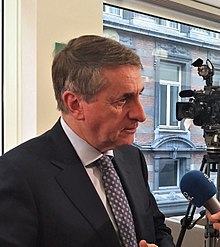Olivier Maingain
Olivier Maingain | |
|---|---|
 Maingain in 2018 | |
| Born | Olivier D. A. Gh. Maingain 3 August 1958 |
| Nationality | Belgian |
| Occupation(s) | politician (DéFI), lawyer |
Olivier D. A. Gh. Maingain (born 3 August 1958) is a Belgian francophone politician and former president of DéFI.
Biography
[edit]Olivier Maingain was born in Woluwe-Saint-Lambert to a Flemish mother and a Walloon father, Roger Maingain (1923-2013) who was deputy secretary of the Association du personnel wallon et francophone des services publics (Association of Walloon and French-speaking civil servants), member of Wallonie Libre' since the Liberation, president of the Ligue wallonne de l'agglomération de Bruxelles since 1960, member of the FDF from its foundation in 1964 and municipal councillor in Woluwe-Saint-Lambert from 1970. [1][2][3][4]
After graduating as Master of Laws he qualified as a lawyer in 1982. In 1983 he became president of the FDF Youth. He was elected as a city councillor of Brussels in 1988. He entered the Parliament of the Brussels-Capital Region in 1989 and he was a Member of the Chamber of Representatives from 1991 to 2019. He became the president of the FDF (English: Democratic Front of the Francophones) in 1995. In 1995 too, he became an alderman of Brussels. He was elected as a city councillor of the municipality of Woluwe-Saint-Lambert in 2006, where the city council voted him for mayor. In the 2007 elections Maingain received 45,439 votes in the electoral district Brussels-Halle-Vilvoorde.
Among the legal measures sponsored by him are a law protecting the confidentiality of journalists' sources and the inclusion in the Belgian Constitution of the principle of the abolition of the death penalty. His efforts also led to the main square of Brussels (the Grand-Place or Grote Markt) being placed on the UNESCO list of World Heritage Sites.
He is critical of the weakness of the Belgian central government and states that the Belgian state does not sufficiently protect the rights of French-speaking Belgian citizens. He feels that supporting a Belgian federated state is "honourable" and is against the "eagerness of certain Flemish political parties to destroy the reality of Brussels". In his view the main political leaders in Flanders show a cynical pragmatism in belittling the role of central government and building up the importance of the region of Flanders. His overly frank style of speaking and the often stigmatising tone of his arguments have caused him to be extremely unpopular in Flanders.
Controversies
[edit]In the run-up to the federal elections of 10 June 2007, he printed and distributed unilingual French election pamphlets in the unilingual Dutch-speaking town of Merchtem.[5]
In 2010 he compared the non-appointments of three French-speaking candidate-mayors by the Flemish government with practices similar to those during the "Nazi occupation" of Belgium.[6]
Notes
[edit]- ^ (interview of his brother, Alain Maingain, candidate for another party) "Maingain parle de sa mère, flamande d’Alost", La Capitale, 6 April 2009
- ^ Francis Van de Woestyne, "Olivier Maingain: "Réhabiliter le sens de l'Etat: une urgence"", La Libre, 6 March 2010
- ^ "htm Les élections communales du 11 octobre 1970 (I), Courrier hebdomadaire du Centre de recherches sociopolitiques (CRISP), 1970/31 (nr 496), p. 1-23
- ^ Chantal Kesteloot, Au nom de la Wallonie et de Bruxelles français: les origines du FDF, Editions Complexe, 2004, p.367
- ^ "Merchtem protesteert tegen eentalige MR-folder". Archived from the original on 26 September 2007. Retrieved 24 January 2008.
- ^ "Maingain vergelijkt Bourgeois met Duitse bezetter – Gazet van Antwerpen". Gva.be. 31 March 2010. Retrieved 28 July 2014.
External links
[edit]- 1958 births
- 21st-century Belgian politicians
- DéFI politicians
- Living people
- Members of the 48th Chamber of Representatives (Belgium)
- Members of the 49th Chamber of Representatives (Belgium)
- Members of the 50th Chamber of Representatives (Belgium)
- Members of the 51st Chamber of Representatives (Belgium)
- Members of the 52nd Chamber of Representatives (Belgium)
- Members of the 53rd Chamber of Representatives (Belgium)
- Members of the 54th Chamber of Representatives (Belgium)
- People from Woluwe-Saint-Lambert
